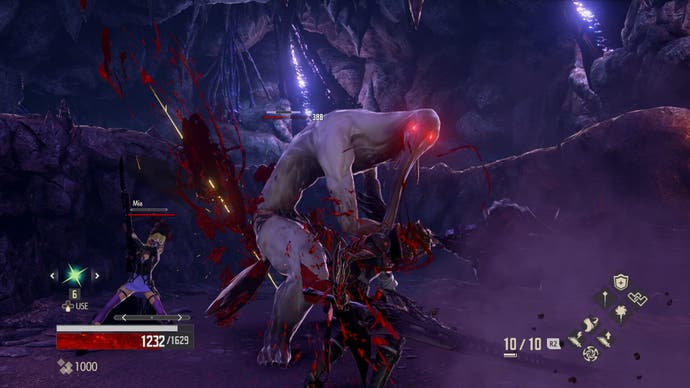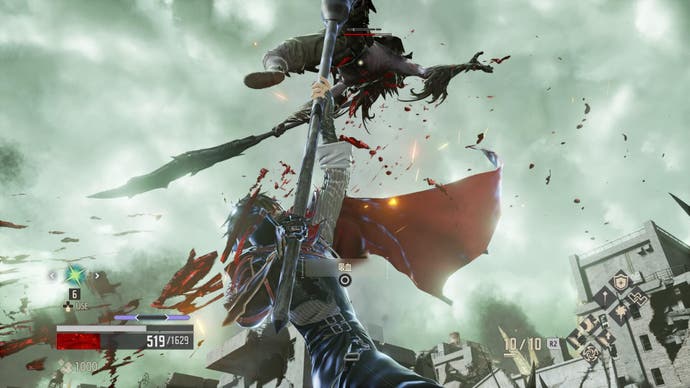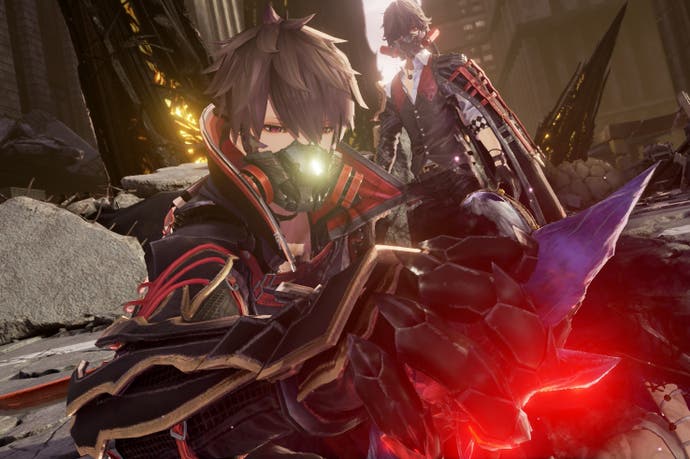Code Vein is anime Bloodborne with added buddy bonding
Soulo campaign.
A third-person action-RPG with XP loss on death, bonfire mechanics and a taste for the grotesque, Code Vein has been billed as Bandai Namco's in-house alternative to the Souls series, trading Bloodborne's fetid strain of European Gothic for a world of anime vampires. Witness the marketing tagline, "prepare to dine". So it's a slight shock to find that the new game breaks one of From Software's unwritten core principles straight out the gate. Integral to every Souls game is the experience of loneliness, that sense that you are the only moving object in a cyclopean expanse of dead architecture and stagnant myths. True, you can summon allies to aid you, but these are presented as fleeting, ethereal interactions, and you never feel like you have "companions", exactly. It's more a question of being haunted by kindred spirits as you set out through the wasteland alone.
Code Vein also deals in wastelands, but you'll have plenty of more persistent and straightforward company throughout, for better and possibly worse. The game is set in a shattered semi-urban environment where amnesiac Revenants search for the Blood Tear fruits they need to subsist without feeding on humans, battling hordes of misshapen Lost vampires who have been consumed by their own bloodlust. Each Revenant you meet in the eponymous Vein has different capabilities and is on a quest of their own, often involving their missing memories. You'll be able to recruit some of them as co-op buddies, and as I discovered, these buddies are a little on the chatty side.

During my demo I was paired with Mia, a baby-faced predator with a powerful rifle. She kept up a running commentary as we explored, responding to everything from lower player health through collecting items to opening the inventory screen. Her remarks were always brief and to the point, in fairness, and the script has a certain, pleasing self-awareness to it: at one stage, the character praised me for swinging at a corpse to ensure that it was genuinely dead, one of the more time-honoured Souls player traditions. Still, it's easy to imagine that trickle of small-talk becoming an annoyance as you push deeper into each dungeon. This kind of thing makes sense in an Uncharted game, but when I'm probing the ghastly secrets of post-apocalyptic catacombs, the last thing I need is background patter.
You can always travel without a buddy, but if you do that, you'll miss out on some fun mechanics. Mia is an effective support providing you keep her out of the mincer, casting buffs on you as monsters approach and doing her best to draw away a little aggro or interrupt attacks as you barge into the throng. Even better, she's a walking bloodbag, sharing her health pool with you when you're about to cop it, providing she won't kill herself in the process. You can return the favour if you have the means, which leads to some great split-second decision-making when the heat is on. Is it worth having Mia around to overclock your attacks and run interference, or should you conserve that precious health and try to muscle through the last third of a boss battle by yourself?

You'll probably need a hand more often than not, because Code Vein is every bit as arduous and arcane as a Souls game, happy to dump you back at a Mistral checkpoint without all your XP if you take its many combat variables for granted. Attacks and dodging burn stamina quickly, and running out will leave you winded, obliging a careful balance of aggression and evasion. Enemies have pronounced trigger zones, and it's usually wise to rile them one by one, picking off archers and grunts before you tangle with anything big and scary. There's a lot going on beneath the surface - weapon power scales with certain character stats, and the customisation screen is a gristly stew of resistances, weight caps and impact types.
Buried in amongst the Soulsy elements are bursts of original thinking that lean on the vampire premise. You can perform a variety of flamboyant charge attacks to drain enemies of Ichor, which allows you to replenish your payload of spells (ranging from flame blasts to elemental weapon buffs) beyond the starting maximum. Still, this is a travel-worn recipe on the whole, and before long, the sense of over-familiarity begins to tell. Ambushes, for instance, are frequent yet never all that surprising. Any veteran of Cainhurst Castle or the Tomb of the Giants will know exactly what to look out for: enemies with their backs turned toward you oh so invitingly, innocent-looking treasure chests near piles of corpses, and grotty slime creatures that drop from the ceiling.
Talkative companions and that slightly slavish adherence to formula aside, Code Vein's aesthetic has its ups and downs. Reminiscent of Bandai Namco's old God Eater series, it's a strange mix of extravagant and murky, spiking concrete grey and oily blackness with puddles of electric blue and orange. Some of the enemy designs are wondrous - my favourite so far is the Queen's Knight, a boss character composed of thorns and chitin with a distressingly long reach - but the weapons (especially the larger double-handed swords) and outfits are occasionally busy to the point of distracting, like they've been thrashed out in isolation from the rest of the art direction. I'm hoping that later environments will introduce a bit more brightness and clarity, though the possibilities are obviously hindered by the choice of a vampire as protagonist.
Code Vein is a game I'm confident I'll enjoy, and one I'd so far recommend to Souls fans and newcomers alike, but I'm not sure I'll ever be captivated by it. The combat has plenty of teeth, and the partner system could be rewarding if the other Revenant buddies are as robustly designed as Mia, but those diminishing returns do take their toll, and what I've experienced of the narrative and world leaves me scratching my head. The greatness of Souls and Bloodborne is that every component feels like the expression of a single, abiding enigma, some vast metaphysical truth that informs everything, and which you piece together at a largely subconscious level as you roam, fight and die. For all the elaborateness of the art and talk of recovering lost memories, I don't yet get that sense from this game. There's plenty of blood pumping through Code Vein, but I'm still searching for its heart.


